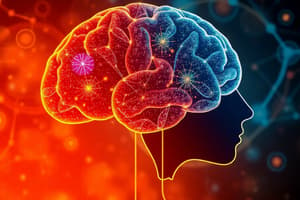Podcast
Questions and Answers
What is the definition of an attitude in the context of social evaluation?
What is the definition of an attitude in the context of social evaluation?
- A neutral stance towards social objects
- An emotional response triggered by behavioral reinforcement
- A set of beliefs that do not influence behavior
- A positive or negative evaluation of an object related to social behavior (correct)
Which process describes the development of more positive feelings towards an object due to familiarity?
Which process describes the development of more positive feelings towards an object due to familiarity?
- Mere Exposure (correct)
- Operant Conditioning
- Self-Perception Theory
- Classical Conditioning
Which of the following best describes prejudice?
Which of the following best describes prejudice?
- A behavioral response influenced by public attitudes
- A cognitive assessment of a group based on stereotypes
- A negative attitude towards specific social outgroups (correct)
- An emotional reaction stemming from classical conditioning
In operant conditioning, how does reinforcement influence attitudes?
In operant conditioning, how does reinforcement influence attitudes?
How does self-perception theory explain the formation of attitudes?
How does self-perception theory explain the formation of attitudes?
What factor increases the likelihood of an attitude changing over time?
What factor increases the likelihood of an attitude changing over time?
Which type of awareness leads individuals to behave in line with their own attitudes?
Which type of awareness leads individuals to behave in line with their own attitudes?
What role do psychological needs play in attitude formation according to the functional approach?
What role do psychological needs play in attitude formation according to the functional approach?
What leads to greater attitude strength and greater attitude-behaviour consistency?
What leads to greater attitude strength and greater attitude-behaviour consistency?
What is a determinant of subjective norms?
What is a determinant of subjective norms?
In the ABC model of attitudes, what does 'A' stand for?
In the ABC model of attitudes, what does 'A' stand for?
Cognitive dissonance is caused by performing an action that is:
Cognitive dissonance is caused by performing an action that is:
Which route of persuasion involves careful analysis of the message content?
Which route of persuasion involves careful analysis of the message content?
What is the concept associated with forgetting the source of a message while remembering its content?
What is the concept associated with forgetting the source of a message while remembering its content?
What can cause a person to experience cognitive dissonance?
What can cause a person to experience cognitive dissonance?
Which factor can lead to individuals taking the peripheral route in persuasion?
Which factor can lead to individuals taking the peripheral route in persuasion?
Which of the following is NOT a factor affecting cognitive dissonance?
Which of the following is NOT a factor affecting cognitive dissonance?
What happens when a person experiences high elaboration during persuasion?
What happens when a person experiences high elaboration during persuasion?
Flashcards
Attitude
Attitude
An evaluation (positive or negative) of something, like a person, thing, event, or issue. Often based on experience or upbringing.
Prejudice
Prejudice
A negative attitude towards a specific social group.
Mere Exposure Effect
Mere Exposure Effect
Becoming more positive towards something by repeated exposure to it.
Associative Learning
Associative Learning
Signup and view all the flashcards
Self-Perception Theory
Self-Perception Theory
Signup and view all the flashcards
Functional Approach (attitudes)
Functional Approach (attitudes)
Signup and view all the flashcards
Private Self-Awareness
Private Self-Awareness
Signup and view all the flashcards
Public Self-Awareness
Public Self-Awareness
Signup and view all the flashcards
Attitude Strength
Attitude Strength
Signup and view all the flashcards
Attitude-behavior Consistency
Attitude-behavior Consistency
Signup and view all the flashcards
Cognitive Dissonance
Cognitive Dissonance
Signup and view all the flashcards
Persuasion
Persuasion
Signup and view all the flashcards
Central Route to Persuasion
Central Route to Persuasion
Signup and view all the flashcards
Peripheral Route to Persuasion
Peripheral Route to Persuasion
Signup and view all the flashcards
Sleeper Effect
Sleeper Effect
Signup and view all the flashcards
Tripartite Model (ABC)
Tripartite Model (ABC)
Signup and view all the flashcards
Determinant of Attitudes
Determinant of Attitudes
Signup and view all the flashcards
Justification
Justification
Signup and view all the flashcards




